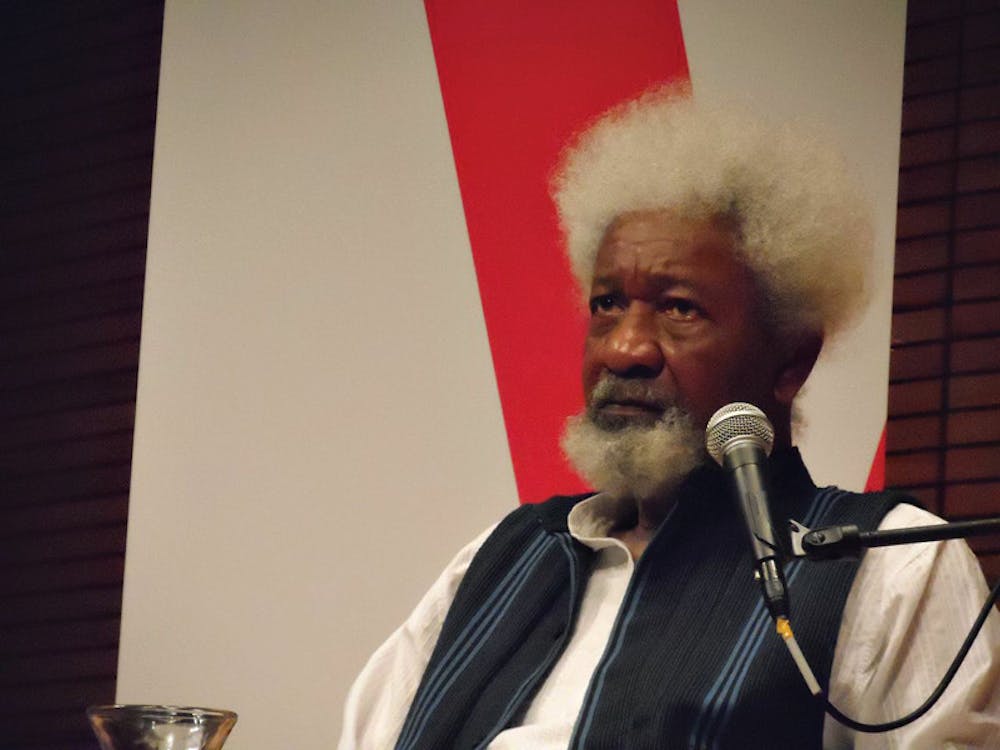“Take a cue from battered humanity of Nigeria: Do not concede a thing to the enemy of humanity,” said Wole Soyinka, Nigerian writer, political activist and winner of the 1986 Nobel Prize in Literature, during a lecture on campus Monday evening. The talk, entitled “Hatched From the Egg of Impunity: A Fowl Called Boko Haram,” was an installment in both the Watson Distinguished Speaker Series and the Africa Initiative Speaker Series.
Though tickets for the talk sold out, not everyone who reserved a ticket showed up, allowing attendees in the overflow room to take seats in the Martinos Auditorium in the Perry and Marty Granoff Center for the Creative Arts.
Soyinka spoke extensively of the history and trajectory of Boko Haram, a militant Islamic group that enforces its extremist religious doctrine through brutal force.
“Boko Haram may have begun as local movement, but over the past three or four years, no one can say it’s not internationalized,” he said.
Soyinka commenced by tracing the group’s origins. Founded as an anti-government sect by Mohammed Yusuf, it eventually gained power and developed into a “universal menace of virulent, fanatic disposition that hides under the cloak of religious propagation,” he said, adding that Yusuf became “more and more ruthless and systematic” as his followers increased.
He went on to describe some of the atrocities committed under this regime, often drawing upon external documents such as news reports to illustrate his narrative, which included arson against Christian chapels, death sentences to journalists and threats at knifepoint to convert to Islam.
“Statistics of organized death simply addle the mind until it seizes up,” he said.
Soyinka attributed the rise of Boko Haram largely to “economic disparities” and a “lack of social opportunities,” citing the experiences of the “marginalized and impoverished, for whom existence becomes meaningless.” For some, he added, it may seem as though the only way to dignify their conditions is through “destructive gestures.”
A major obstacle to justice lies in the corruption and hypocrisy of government officials, whose immunity to the threat of Boko Haram allows them “to partake in the status of secret power” of the organization, Soyinka said.
At one point, Soyinka read an excerpt from a letter sent to the U.S. State Department arguing for the exclusion of Boko Haram from its list of terrorist organizations. Though the letter included a cogent argument, it was a “study in speciousness,” Soyinka said — the letter effectively denied the organization’s terrorist foundations.
The misconception that Boko Haram is a “ragtag bunch of casual incendiaries and suicide bombers” dangerously underestimates what its members’ “sophisticated minds” are capable of, he said, adding that the members’ experiences with analyzing foreign policy allows them to manipulate the group’s international image.
Ultimately, Boko Haram serves “as a reminder that social justice remains incomplete without penetration through some very lamentable beginnings,” Soyinka said.
Questions from the audience dealt with how to prevent atrocities such as those inflicted by Boko Haram, on levels both political and personal.
In response to an inquiry about the role of U.S. foreign policy in resolving these conflicts, Soyinka drew laughter from the audience when he quipped: “Collaborate. And don’t recolonize.”
He added that the United States is “just another country,” and the extent to which it can effectively intervene is limited. Instead, he stressed the importance of collaboration between neighboring countries during times of conflict, as they are the “primary stakeholders” in bringing about resolution.
Despite the gravity of his subject matter, Soyinka ended on a note of hope. “It’s never too late to return to the path of truth,” he said. “Of course, that opens up another debate altogether: What is the truth?”

ADVERTISEMENT




